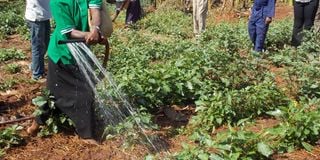Prime
Farming challenges, successes in 2022

Crop irrigation is the way to go now due to climate change. PHOTO | MICHEAL J. SSALI
Following the Covid-19 lockdowns the country went through, many people gave more attention to agriculture, according to Mr Disan Muwanga, Founder of Buddu Banana Restoration Organisation. Muwanga who also works as Buddu Agricultural Extension Officer under Buganda Kingdom Agricultural Development Foundation (BUKADEF), says: “They had discovered that there is a lot of money to be earned from banana growing and they all rushed into farming. But the majority did not even have the basic skills of farming. They would plant the banana suckers and just expect them to grow and produce bananas after some time. But they were disappointed when the bananas they planted did not yield the expected results. Many saw the plantains yellowing and withering and they did not have the slightest clue why things did not go well for them.”
He says one of his biggest challenges was to supervise farmers whose main interest in farming was to see large banana bunches without them providing the necessary environment for the bananas to grow well. He said bananas are prone to certain pests and diseases that must constantly be fought and avoided by the farmer. He held regular farmers’ meetings to talk about banana pests and diseases and how they can be fought and avoided. They had to be taught how to keep the soil well nourished. His main emphasis was on crop farmers also taking up livestock rearing. He had to demonstrate to them how livestock produces organic manure which is then mixed with the soil where bananas are planted. Muwanga, who studied botany and zoology at Makerere and carried out intensive research on banana production, had to teach the farmers the importance of burying the weeds in the soil instead of spraying them with herbicides. He also put emphasis on mulching to keep the soil moist and to minimise soil erosion.
His other challenge throughout the year has been to explain to the farmers the danger of land fragmentation.
“Here in Buganda and elsewhere, whenever the head of the household dies the land is divided up into smaller pieces for each one of his children to inherit a small portion of it. Some of the children try hard to practice some form of farming while many others sell their portions. The best thing would be for each family to develop the farming activities on the family land as a family business and to share the profits instead of subdividing the land,” he says.
Food price increase
The earlier months of the year saw a sharp rise in food prices which most people attributed to the long drought that hit the country. Dr Priver Namanya who heads the National Banana Research Program in NARO (National Agricultural Research Organisation) has some explanation about the problem.
“We have to appreciate that it is not just food prices that went up,” she says.
“Fuel prices went up and many other commodities that we buy from shops like soap and salt became very expensive. Therefore, any farmer selling his product, whether it is tomatoes, potatoes or beans, is forced to raise the price. However, we have to remember that in Uganda we generally practice what is known as rain-fed agriculture. When the rains fail, food production becomes difficult.”
Dr Namanya went on to disclose that banana prices particularly went up due to scarcity following devastating rainstorms in most parts of banana producing regions, especially in western Uganda that felled entire banana plantations. She believes that the prices will go down with increased production. She also said banana production is hampered by diseases like black sigatoka or leaf spot fungal disease, and pests like nematodes and weevils that are difficult for most farmers to control. She said that the Central Region is at a disadvantage to overcome some of the pests and diseases because of its lower altitude and high humidity which promote their survival.
“At NARO we have developed hybrid cooking banana varieties which are resistant to pests and diseases and these are the type of bananas that we nowadays advise the farmers to plant,” she says. She described the bananas as Naroban 1 and Naroban 2, among others, and she disclosed that the bananas have already been made available to farmers in different regions across the country, including the Albertine region, western Uganda, Bugisu, Northern Uganda and parts of Buganda. She pointed out however that the banana varieties given out are not resistant to the dreaded banana bacterial wilt disease (BBWD) which is not curable but can be controlled by careful farmers.
Erratic weather
Dr David Okello Kalule, Principal Research Officer in Naro (National Agricultural Research Organisation) has said that most of the crop production problems have been due to the erratic and unpredictable rain pattern.
“Farmers are no longer certain when the rains are likely to begin or to end,” he says.
Dr Kalule, who has done a lot of research on groundnuts and other crops in Eastern Uganda, says the puzzling rains have caused losses to farmers who plant seeds upon noting the first signs of rain only for the rains to stop for several weeks. In some cases, the rains are too much and the crops don’t do well.
His advice is that farmers should go for early maturing seed varieties and drought tolerant seeds that have been developed by Naro. There are such varieties for crops like beans, groundnuts, and maize. He said he is also happy because President Museveni is putting emphasis on irrigation.
“This is an issue that must be paid a lot of attention to by both the Ministry of Water and Environment and the Ministry of Agriculture Animal Industry and Fisheries. We must strongly emphasise a water harvesting culture and to find a way of pumping water from our many water bodies to regions where it is.




